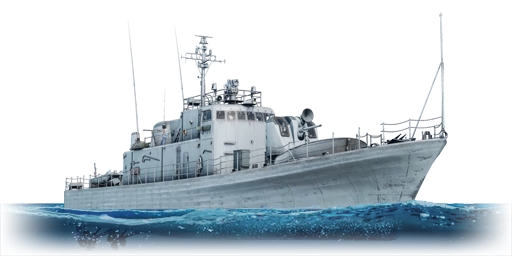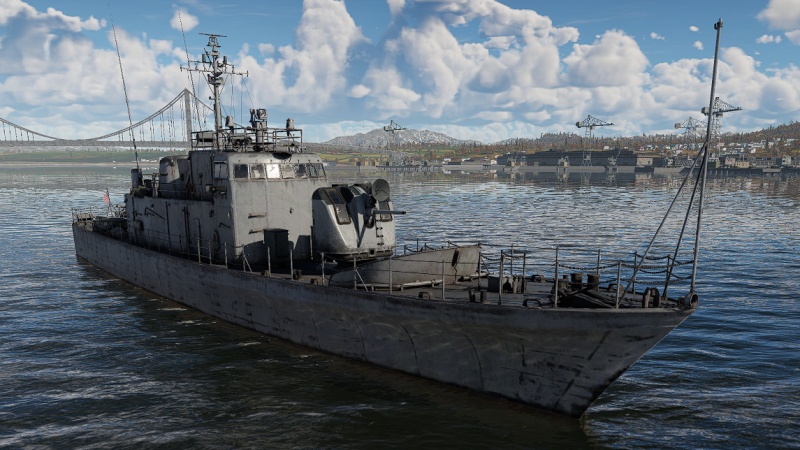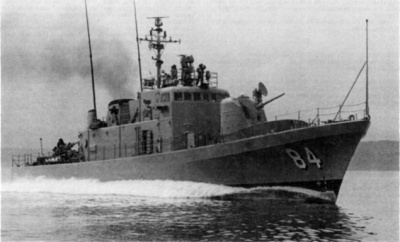Difference between revisions of "USS Asheville"
Noracane260 (talk | contribs) (added Pro's and Con's) (Tag: Visual edit) |
Noracane260 (talk | contribs) (Added section to useages in battle) (Tag: Visual edit) |
||
| Line 48: | Line 48: | ||
== Usage in battles == | == Usage in battles == | ||
| − | + | Asheville currently has a peculiar playstyle compared to other costal vessels due to updated damage modules and changes to 3" shells, Asheville is a glass cannon that can no longer hull break light PT boats as was possible in previous updates, nor survive for an expended period of time since the majority of crew is found in the bridge which can be easily knocked out. Because of this, positioning is the most important skill for a captain of an Asheville if they wish to produce results. Finding firing angles that apposing ships don't expect and hitting them in rapid succession until they die is the bread and butter of Asheville's gameplay. If the target fails to die after the fourth or fifth shot, GET OUT. Any retaliation the Asheville faces is likely to end in her demise, so don't let the enemy even get a glance of Asheville and captains will do much better playing her.  | |
=== Pros and cons === | === Pros and cons === | ||
''Summarise and briefly evaluate the vehicle in terms of its characteristics and combat effectiveness. Mark its pros and cons in the bulleted list. Try not to use more than 6 points for each of the characteristics. Avoid using categorical definitions such as "bad", "good" and the like - use substitutions with softer forms such as "inadequate" and "effective".'' | ''Summarise and briefly evaluate the vehicle in terms of its characteristics and combat effectiveness. Mark its pros and cons in the bulleted list. Try not to use more than 6 points for each of the characteristics. Avoid using categorical definitions such as "bad", "good" and the like - use substitutions with softer forms such as "inadequate" and "effective".'' | ||
| − | '''Pros:''' | + | '''Pros:''' |
| − | |||
| − | |||
| − | |||
| − | |||
| − | |||
* | * | ||
'''Cons:''' | '''Cons:''' | ||
| − | |||
| − | |||
| − | |||
| − | |||
| − | |||
* | * | ||
Revision as of 17:59, 25 October 2022
Contents
Description
The Asheville-class, USS Asheville (PGM-84) is a rank IV American motor gun boat with a battle rating of 3.3 (AB/RB/SB). It was introduced in Update 1.79 "Project X" as part of the fleet closed beta test.
General info
Survivability and armour
The USS Asheville suffers from a severe lack of armour, even against small arms fire. As a light coastal vessel, it does not have access to anti-fragmentation armour with an armour thickness barely surpassing 8 mm. This lack of armour is compensated with an impressive mobility. Due to the superstructure being very tall, it is a primary target for enemy fire, making it easy for all sorts of calibre to significantly damage the bridge and leave the ship commandless until it is repaired. The best armour for the Asheville is to remain unseen and hidden, primarily close to rocky locations or against any environmental cover that is big enough for the Asheville.
Mobility
The Asheville is a pretty agile vessel, featuring a CODOG (Combined Diesel Or Gas) propulsion system, making it able to reach high speeds in a quick manner. It has a pretty responsive rudder even at low speeds. However, sometimes the rudder tends to "stick" when going backwards, making relatively hard to keep a constant heading while going on reverse. While it is not faster than many of the rest of coastal vessels seen in game, it certainly has a high endurance and speed for a vessel its size.
| Mobility Characteristics | |||
|---|---|---|---|
| Game Mode | Upgrade Status | Maximum Speed (km/h) | |
| Forward | Reverse | ||
| AB | |||
| Upgraded | 97 | 46 | |
| RB/SB | |||
| Upgraded | 72 | 34 | |
Modifications and economy
Armament
Primary armament
The main armament is the 76 mm Mk.34 gun located on the bow. It has an excellent rate of fire and elevation angles. It has access to HE, APHE and HE-VT rounds. At its battle rating, HE rounds inflict great damage to smaller boats and the gun accuracy allows to use this round with success against bigger targets and destroyers at closer ranges. APHE shells are of great use versus more armoured gun boats allowing you to deal with them way faster. HE-VT rounds combined with excellent gun elevation angles and radar allow you to deal with planes from a safe distance, compensating for the lacking dedicated anti-air armament. Switching ammo type can take around 10 seconds. The gun also overheats quickly and it can take some time to bring it back online, which should be taken into account when engaging bigger or more numerous targets.
Secondary armament
The Asheville has a single 40 mm L/60 Mark 3 Bofors cannon located on the stern. While it might not seem extremely useful in combat, in practice it helps mitigate weaknesses of the primary armament. It provides a fast way to deal with threats directly behind the ship where the main gun can't cover or it can even be used to replace the main cannon during repairs. Its good damage output combined with a very short reload time allows you to shred any lighter enemy vessels. Overall, it's a great secondary to have for close quarters situations the main battery won't be able to handle.
Anti-aircraft armament
The Asheville has access to two twin AN-M2 12.7 mm heavy machine guns. They are effective against lightly armoured vessels and low-flying aircraft and have little use outside those two target groups.
Usage in battles
Asheville currently has a peculiar playstyle compared to other costal vessels due to updated damage modules and changes to 3" shells, Asheville is a glass cannon that can no longer hull break light PT boats as was possible in previous updates, nor survive for an expended period of time since the majority of crew is found in the bridge which can be easily knocked out. Because of this, positioning is the most important skill for a captain of an Asheville if they wish to produce results. Finding firing angles that apposing ships don't expect and hitting them in rapid succession until they die is the bread and butter of Asheville's gameplay. If the target fails to die after the fourth or fifth shot, GET OUT. Any retaliation the Asheville faces is likely to end in her demise, so don't let the enemy even get a glance of Asheville and captains will do much better playing her. 
Pros and cons
Summarise and briefly evaluate the vehicle in terms of its characteristics and combat effectiveness. Mark its pros and cons in the bulleted list. Try not to use more than 6 points for each of the characteristics. Avoid using categorical definitions such as "bad", "good" and the like - use substitutions with softer forms such as "inadequate" and "effective".
Pros:
Cons:
History
USS Asheville (PGM-84) was the lead ship of the Asheville class, a series of seventeen patrol gunboats built for the US Navy. Completed in 1967, she saw service in the Vietnam War as a blockade ship and patrol vessel. Following the end of hostilities in Vietnam, Asheville returned to the United States as a training vessel; she would eventually serve as a training ship in the Great Lakes, and was transferred in 1977 to the Massachusetts Maritime Academy.[1][2]
Design and construction
The Asheville was designed as a small gunboat, and thus displaced 240 tons. She carried an armament of a single 3-inch (76 mm) gun at the bow, a 40 mm Bofors gun at the rear and two 12.7 mm heavy machine guns.[2] Being a patrol boat, she had a small crew complement of just 37. Equipped with a CODOG (combined gas and diesel propulsion) system, she could make a top speed of 40 knots (74 km/h).[2] Asheville was laid down on April 15th 1964 by the Tacoma boat-building company. She was launched on May 1st 1965, and commissioned on April 1st 1967.[2]
Operational History
Following her commissioning and shakedown cruise, the Asheville was homeported at San Diego, California. She departed the port in April and sailed to Hawaii, then Guam, then her final destination of South Vietnam to serve in the Vietnam War.[1] She saw eight years of service in the Asian and Pacific theatre, though large parts were spent in port due to a shortage of men and engine parts to service her rather unreliable propulsion system. She frequently conducted blockade missions off of the Vietnamese coast, in an effort to prevent the flow of arms and supplies to the communist rebels in South Vietnam.[1][2]
In December of 1972, the United States stopped its military involvement in Vietnam; this halted Asheville's combat activities. She remained in the Western Pacific for an additional two years, visiting a variety of Pacific ports. She then sailed for Chicago via the Panama canal, and arrived at her final destination in December of 1974. She served as a training vessel on the Great lakes between 1974 and 1977;[1] she was decommissioned on January 31st 1977 and simultaneously stricken from the navy list. She was then given to the Maine Maritime academy as a training vessel; her name is now taken by USS Asheville (SSN-758), a Los Angeles-class nuclear submarine.[1]
Media
- Skins
See also
Links to articles on the War Thunder Wiki that you think will be useful for the reader, for example:
- reference to the series of the ship;
- links to approximate analogues of other nations and research trees.
External links
References
- Citations
- Bibliography
- Ashe, W., & Holland, R. (2006). Asheville, USS. Retrieved November 19, 2020, from https://ncpedia.org/asheville-uss
- Priolo, G. (1996). NavSource Online:Motor Gunboat/Patrol Gunboat Photo Archive. Retrieved November 19, 2020, from http://www.navsource.org/archives/12/11084.htm
| Tacoma Boatbuilding Co. | |
|---|---|
| Motor Gunboats (PGM) | |
| Asheville-class | USS Asheville · USS Douglas |
| USA boats | |
|---|---|
| Motor torpedo boats | PT-3 · PT-6 · PT-20 · PT-71 · PT-103 · PT-109 · PT-174 |
| PT-200 · PT-314 · Thunderbolt (PT-556) · PT-565 · PT-658 · PT-810 · PT-811 · PT-812 | |
| Motor gun boats | Kim Qui · LCS(L)(3) · PT-59 · PTF-7 · USS Candid · USS Asheville · USS Douglas · USS Flagstaff · USS Tucumcari · USS Cyclone |
| Armoured gun boats | LCM(6) Zippo |






